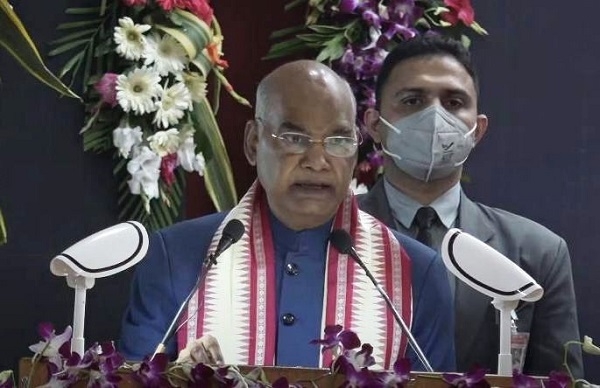Prez Kovind at NIT Rourkela says NEP aims to make India 'Global Knowledge Superpower in 21st century'
22 Mar 2021 12:01:52
New Delhi, Mar 22: The President of India, Ram Nath Kovind said while addressing the 18th annual convocation of NIT Rourkela in Odisha, on Mar 21 that one objective of the National Education Policy is to make India a global knowledge super power in 21st century and institutions like NIT Rourkela have to play a major role in achieving these national aims.

The President said that as the 2nd largest govt run Technology Institute in Eastern India, NIT Rourkela has made significant contribution to the field of engineering and technology. For over six decades, this institution has been enriching the pool of technical professionals in the country. Pointing to the fact that NIT Rourkela has students from all over India and also from other countries, the President said that the community of over 7000 students studying in the 700 acre campus represents rich diversity.
Also read: Despite COVID, India operationalize 70,000 Health and Wellness Centres under Ayushman Bharat
This increases cross-pollination of learning and promotes understanding between different cultures. It also strengthens people-to-people ties between nations. Raising the issue of less participation of women in technical education, the President said that in most of the convocations that he attended across the country, he noticed that girl students are outshining boy students in liberal arts, humanities, medical sciences, law and several other areas. However, it has also been observed that the enrollment of women in technical and scientific disciplines is low.
Referring to the implementation of the National Education Policy 2020, the President said that the policy envisions that engineering institutions should move towards more holistic and multi-disciplinary education with increased emphasis on arts and humanities. The President noted that NIT Rourkela has already adopted this approach to a certain extent.
He was also happy to note that NIT Rourkela has adopted five villages, as part of ‘Unnat Bharat Abhiyan’ and upgrading science laboratories as well as providing computer education in those villages. President Kovind also noted that a Poverty Alleviation Research Center at this campus works for the less-privileged people of Kalahandi, Balangir and Koraput region of Odisha.
